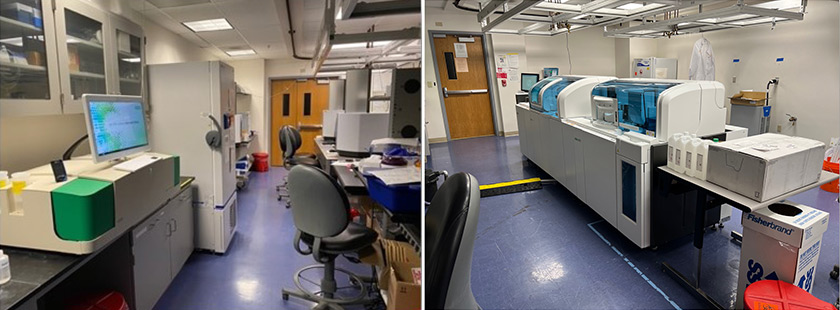Clinical Investigational Lab

The Center for Diagnostic Innovation (CDxI) operates a CLIA certified high complexity laboratory supporting both clinical and research testing. Testing can support both FDA regulated and non-regulated trials, as well as investigator initiated studies. CLIA certification allows fully validated tests to be used for patient care, and providing researchers with confidence that all testing is of the highest quality. During emergencies, this laboratory also acts as a special operations site to deploy testing such as for biothreat and pandemic pathogen detection. The CDxI Investigational Laboratory also operates a mobile CLIA certification allowing the study and implementation of field testing solutions.
Capabilities
- Clinical Chemistry
- Molecular Diagnostics
- Digital Droplet PCR
- Multiplex Respiratory Pathogen Detection
Partners
- Commercial IVD manufacturers
- UC Davis start-ups and investigators
- External academic institutions
Services
Molecular / Tissue Diagnostics
- Digital Droplet PCR
- SARS-CoV-2 Testing
- Open Plate Real-Time PCR
- Rapid Multiplex RT-PCR
- Respiratory Panel
- Pneumonia Panel
- Biothreat Panel
- GI panel
- Meningitis Panel
- Joint Infection Panel
Chemistry and Immunoassays
- Automated Chemistry
- Electrolytes, Glucose, BUN, Creatinine
- Blood Gases
- Lipase, Total Protein, Albumin, AST, ALT, Calcium
- Automated Immunoassay
- Cardiac biomarkers
- Cancer biomarkers
- Hormones
- Therapeutic Drug Monitoring
- Toxicology
- Infectious Diseases
- Vitamins
- Mass Spectrometry
Hematology / Coagulation
- Thromboelastography
- Platelet Function Assay
- Complete Blood Count
- Hemoglobin
- Hematocrit
- Platelets
- White blood cell count w/ differential
Predictive Analytics
- Data from both health system and the CDxI investigational laboratory provide means to apply data sciences.
- Use of novel automated machine learning accelerates identification of new algorithms that have clinical potential.
- Traditionally, ML models are programmed manually by a highly trained data scientist.
- Manual programming relies on the data scientists expertise and perhaps prior assumptions and biases to produce and refine models.
- MILO does not come in with assumptions or biases. All combinations of features (predictors) are trained-tested across common ML methods.
- Let the user decide which model is best based on MILO’s output.




